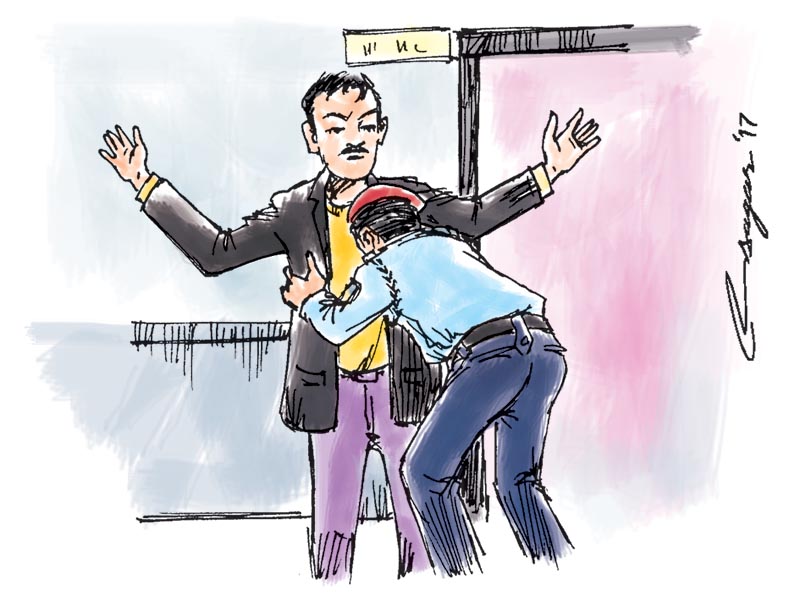Transnational crimes: New paradigm
The restriction alone in open border is not the solution rather it would have detrimental impacts upon the economy and strain relation
The paradigm of Trans-National Crimes have become a complex global challenge. Global governance has difficulty to keep pace with economic globalization because of its double edged sword nature. The openness in trade, finance, travel and communication has created economic growth and well-being, simultaneously giving opportunities to criminals.
Trans-National Crimes are carried across national/international borders for financial, and socio-political benefits which are imminent threats to national security. Human slavery as human trafficking is the third largest illicit global trade beside drugs and guns. Many trafficked victims serve as sex or domestic slaves. The United Nations estimates global trafficking involves four million people annually generating $7-10 billion and 35,000 Nepalese girls are sold to Indian brothels and the Middle-East annually.
The smuggling of 2.5-3 million migrants are from South East Asia, Africa to Europe and from Latin America to US. Europe is the highest heroin market while Russia is the largest heroin consumer (70 tons). Raw heroin, psychotropic substances, amphetamine are abused in Nepal and smuggled from India, Thailand. Nepal is a transit route to Trans-National Crimes.
Criminals are trapping territorial waters, diplomatic passports, pouches, with immunity from prosecution influencing political processes by funding key politicians. From counterfeit drugs to identity theft, credit-card fraud, illegal transactions are increasingly infiltrating legitimate businesses.
Annually 1.5 million people suffer identity theft, with a loss amounting to US$ 1 billion, while cyber crime is endangering the security of nations: power grids, air trafficking and penetrating nuclear installations. Cyber space is one domain that recognizes no national boundaries or man-made sovereignty. Globally Trans-National Crime has an annual expenditure of $ 1 trillion and 1 trillion dollars on bribery.
The state is hollowed out captured by crooked cliques hiding criminal activities behind the veil of legitimacy and by using proceeds of crime to build patronage networks. Collapse of the rule of law can strengthen appeal of political groups offering extreme alternatives, even authoritarian rule. The Global Trend of Lone Wolf Terrorist incidents in Europe is a new mode of attack. According to UNODC, drug trafficking, Trans-National Crime, smuggling of illicit firearms and money laundering are integral parts of terrorism. Nepal and India have overarching security issues with terrorist impacting the open border, a leeway to perpetrators to evade arrests by sneaking to Nepal or vice versa.
The restriction alone in open border is not the solution rather it would have detrimental impacts upon the economy and strain relation. The effective measure would be to implement Limited Regulated Border Monitoring Management in risk prone areas controlling crime and terrorism with sufficient security personnel with techno-scientific support in the border. The geo-political situation not only addresses mutual security considerations but also fosters socio-economic bilateral relations. It has allowed Nepalese and Indians to find employment and business. No man’s land is being used as hideouts and criminal and terrorist activities. Border security of India and Nepal is significant where threats exist for both countries. Without a global perspective there cannot be an evidenced based policy. States have to look beyond borders to protect their sovereignty. The 23rd Regional Interpol Conference in Kathmandu pointed Nepal as a transit hub for smuggling drugs, gold, animal parts and safe haven for criminals and terrorists.
The existing border security policies need to be revamped empowering the Indo-Nepal Joint working Group and Border District Coordination Committee. It is imperative to break the economic power of trans-national criminal syndicates protecting regulated market from criminal penetration and preventing criminal facilitation of terrorist activities.
Special Border Surveillance and Informant Teams must be deputed in borders and airports. The UN Convention against Transnational Organized Crime, Financial Action Task Force and World Bank to combat Trans Border Organized Crime by conducting assessments of anti-money laundering provisions and International Criminal Police Organization’s (Interpol) joint endeavor must be robustly materialized.
The existing geo-political, social, religious, economic bondage and security are interrelated. The importance of an integrated regional energy grid and mutual energy interdependence, sharing water might offer plausible pathways to regional cooperation serving as building blocks for strengthening a new paradigm of political and security cooperation.
In essence we have to cooperate and collaborate on security interest as a result of economic integration thereby setting up task forces to prevent cross-border crimes, for trans-border intelligence sharing, law enforcement cooperation, conducting intel-guided operation, coordinated patrolling, solving border disputes and developing infrastructure, cooperating to multiply our efforts along the border devoid of conflicts to strengthen rule of law and defeat security challenges. Nepal has always cooperated and rendered its utmost efforts to deter threats to national security, neighboring nations, South Asia and global security.
Lama is Inspector General, Retd, Armed Police Chairman, Ex-Armed Police Force






